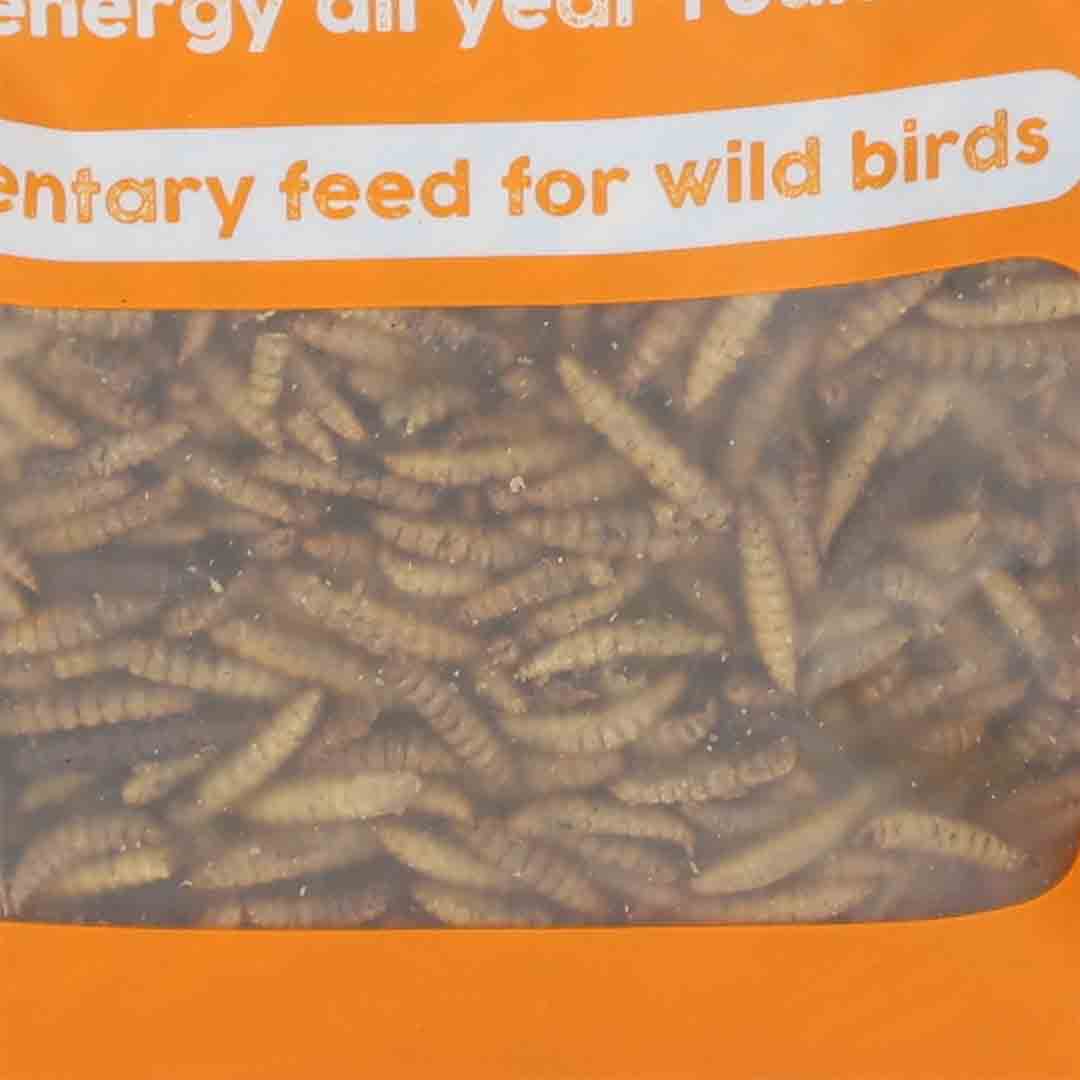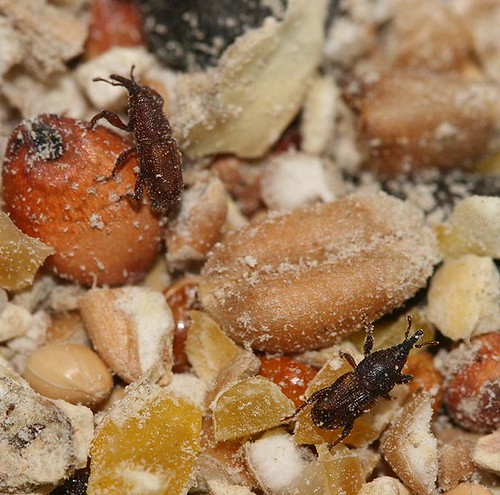Have you ever opened your bird food bag and noticed tiny worms crawling inside? It’s a common and frustrating problem that can leave you wondering if your birds are at risk.
You might be asking yourself, “Why are there tiny worms in my bird food? ” and “What should I do next? ” Understanding what these little invaders are and why they appear can save your bird’s health and your peace of mind.
Keep reading, because we’re about to uncover the surprising reasons behind those tiny worms and share simple steps you can take to keep your bird food fresh and safe.
Common Worms Found In Bird Food
Finding tiny worms in bird food is a common problem for many bird owners. These worms can spoil the food and harm your birds.
It is important to know what types of worms appear and how they get into the food. This helps to prevent and control the issue.
Types Of Tiny Worms
Several small worm-like insects can grow in bird food. These worms feed on seeds and grains stored in poor conditions.
- Maggots:These are fly larvae. They appear when flies lay eggs on moist food.
- Grain Moths Larvae:Small caterpillar-like worms that eat stored grains.
- Mealworms:These worms grow in old, damp bird feed.
- Flour Beetle Larvae:Tiny worms that infest dry seed mixes.
How Worms Get Into Bird Food
Worms enter bird food through eggs laid by adult insects. These eggs hatch when conditions are good for growth.
Warmth, moisture, and old food help eggs develop into worms. Poor storage increases the chance of worms appearing.
- Flies and moths lay eggs on or near bird food.
- High humidity makes food damp, attracting insects.
- Food left open or in warm places is easy to infest.
- Old or expired food is more likely to have worms.
Causes Of Worm Infestation
Tiny worms in bird food can be surprising and unpleasant. These worms often come from certain conditions that allow them to grow.
Understanding the causes helps stop worm infestations and keeps bird food safe and clean.
Storage Issues
Storing bird food in warm, moist places creates a perfect home for worms. Open bags or containers let bugs and eggs enter easily.
Old or damaged storage containers let moisture build up, making worms grow faster.
- Keep bird food in cool, dry places
- Use airtight containers to protect food
- Check for holes or tears in packaging
- Clean storage areas regularly
Environmental Factors
Warm temperatures and high humidity help worms hatch and multiply. Birds’ feeding spots near soil or plants can bring in pests.
Outdoor bird feeders may attract insects that carry worm eggs to the food.
- Place feeders away from damp areas
- Keep feeding spots clean and dry
- Remove leftover food to avoid pests
- Inspect food regularly for signs of worms
Quality Of Bird Food
Low-quality bird food may contain worm eggs or larvae from poor processing. Old or expired food increases the chance of worm growth.
Buying fresh, well-packaged food lowers the risk of worm infestation.
- Choose fresh bird food with good packaging
- Check expiration dates before buying
- Avoid buying damaged or open bags
- Store food properly after purchase
Risks To Birds
Finding tiny worms in bird food can be worrying for pet owners. These worms may harm your birds if eaten. It is important to know the risks and keep your birds safe.
Birds can get sick from contaminated food. The worms may carry bacteria or parasites. This can cause health problems and change bird behavior.
Health Effects
Eating food with worms can cause several health issues for birds. The worms may irritate their digestive system or cause infections. Birds might also lose weight or have weak feathers.
- Diarrhea and vomiting
- Loss of appetite
- Weakness and lethargy
- Feather damage
- Possible parasite infections
Behavioral Changes
Birds with worms in their food may act differently. They can become less active or hide more often. Some birds may stop singing or lose interest in playing.
| Behavior | Possible Cause |
| Less movement | Weakness from illness |
| Hiding | Discomfort or pain |
| Loss of vocalization | Stress or fatigue |
| Loss of appetite | Digestive upset |
| Aggression | Irritation or discomfort |

Credit: drkilligans.com
Preventing Worm Contamination
Tiny worms in bird food come from poor storage or dirty containers. These pests can harm your birds.
Keeping bird food clean and fresh stops worms from growing and spreading.
Proper Storage Techniques
Store bird food in dry, cool places to avoid moisture. Moisture invites worms and mold.
- Use airtight containers made of plastic or metal.
- Keep food off the ground and away from sunlight.
- Store small amounts to use quickly and avoid long storage.
- Check food for bugs before buying or storing.
Choosing Safe Bird Food
Pick bird food from trusted sources. Good quality food has fewer chances of worms.
| Food Type | Risk of Worms | Tips |
| Seed Mixes | Medium | Buy fresh, check packaging |
| Pellets | Low | Store sealed, avoid damaged bags |
| Millet Sprays | High | Use quickly, inspect before use |
| Suet Cakes | Low | Keep cold and dry |
Regular Cleaning Practices
Clean bird feeders and storage containers often. Dirt and old food attract worms.
Follow these cleaning tips:
- Wash feeders with warm, soapy water every week.
- Rinse containers well to remove soap residues.
- Dry all items completely before refilling.
- Remove any spilled food from feeding areas daily.
Getting Rid Of Worms In Bird Food
Tiny worms in bird food can be frustrating and unsafe for your birds. These worms usually come from pests that find bird seeds tasty. Removing them quickly helps keep your birds healthy.
This guide explains how to get rid of worms in bird food using safe disposal, natural remedies, and knowing when to replace the food.
Safe Disposal Methods
Throwing away infested bird food properly stops worms from spreading. Use these safe ways to dispose of the food.
- Seal the bird food in a plastic bag before throwing it in the trash.
- Do not compost worm-infested bird food to avoid spreading pests.
- Clean the bird feeder with hot water and soap after emptying it.
- Store leftover food away from animals and insects.
Natural Remedies
Try these natural methods to keep worms out of bird food and feeders.
| Remedy | How It Works |
| Bay Leaves | Repels insects and worms when placed in storage containers |
| Vinegar Solution | Use diluted vinegar to clean feeders and kill eggs |
| Freezing | Freeze bird seeds for 48 hours to kill worms and eggs |
| Sun Drying | Expose seeds to sunlight to reduce moisture and pests |
When To Replace Bird Food
Knowing when to replace bird food keeps your birds safe and healthy. Replace food if you notice these signs:
- Visible worms or larvae in the food.
- Unpleasant smell or mold growth.
- Food is old or past the expiration date.
- Food is clumped or has moisture.

Credit: www.livingwithbirds.com
Maintaining Bird Health
Finding tiny worms in bird food can be worrying. It is important to keep your bird healthy and safe.
Small worms often come from stored seeds or grains. They can affect your bird’s health if not managed properly.
Monitoring Bird Behavior
Watch your bird closely for any signs of illness. Changes in eating, droppings, or energy can mean a problem.
- Check if your bird is eating less than usual
- Look for unusual droppings or diarrhea
- Notice if your bird is less active or hides more
- Observe any feather loss or itching
Veterinary Care Tips
Regular visits to the vet help keep your bird healthy. The vet can check for parasites and infections.
| Care Tip | Reason |
| Clean birdcage weekly | Prevents worm eggs and bacteria build-up |
| Store bird food in sealed containers | Stops worms from growing in food |
| Bring sample of bird food or droppings to vet | Helps diagnose infections or worms |
| Follow vet’s instructions for medication | Ensures proper treatment of parasites |

Credit: www.jollyes.co.uk
Frequently Asked Questions
What Causes Tiny Worms In Bird Food?
Tiny worms in bird food are usually grain moth larvae or weevils. They thrive in warm, humid storage conditions. Poorly sealed or old birdseed encourages infestation. Regularly inspect and store bird food in airtight containers to prevent worms.
Are These Worms Harmful To My Birds?
Generally, these tiny worms are not harmful to birds. Birds often eat insects naturally. However, heavy infestations can spoil the food quality. It’s best to discard infested bird food to ensure your pet’s health and safety.
How Can I Prevent Worms In Bird Food?
Store bird food in cool, dry places in airtight containers. Avoid buying bulk seed that stays unused for months. Regularly clean feeding areas and discard old or damp seed to stop worm infestations.
Can I Feed Bird Food With Tiny Worms?
Feeding bird food containing small worms occasionally is usually safe. Birds often consume insects in the wild. However, large worm infestations may indicate spoilage. In such cases, replace the food to maintain bird health.
Conclusion
Tiny worms in bird food can be a common issue. These pests often come from improper storage. Keep bird food dry and sealed tightly. This prevents unwanted infestations. Regularly check your bird food for signs of pests. Discard any contaminated food immediately.
Clean storage areas to avoid future problems. Choose high-quality bird food from trusted sources. This helps ensure it’s free from pests. By taking these steps, you keep your feathered friends healthy and happy. Enjoy watching them thrive!

